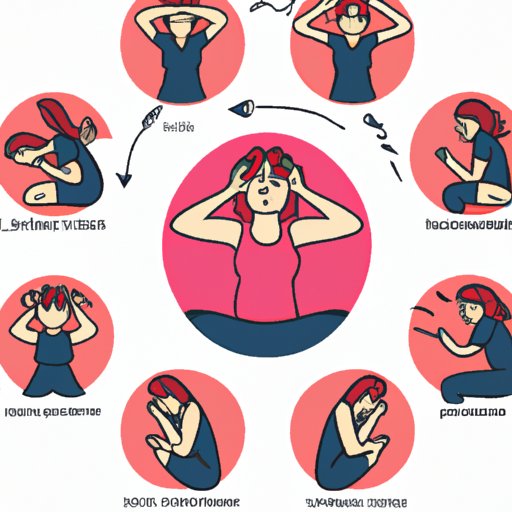Introduction
Anxiety is a common mental health condition that affects millions of people around the world. It is characterized by feelings of fear, worry and uneasiness, and can have a significant impact on an individual’s quality of life. Research has shown that exercise can be an effective way to manage anxiety and reduce its symptoms, and this article will explore how physical activity can help.
Exploring How Exercise Alleviates Anxiety Symptoms
It is widely accepted that there is a strong connection between physical and mental health. Regular exercise has been linked to improved mood, increased self-esteem, better sleep and reduced levels of stress and anxiety.
Studies have shown that exercise can have a positive effect on the brain. Physical activity stimulates the release of endorphins, which are hormones that can act as natural painkillers. Endorphins also give us a feeling of euphoria, which is why exercising can make us feel so good. Exercise also increases serotonin production, which can help to regulate mood, appetite and sleep.
Furthermore, exercise can be an effective distraction from anxious thoughts and worries. When we focus on the physical sensations associated with exercise, such as our breathing and muscle movements, it can help to take our mind off stressful or anxious thoughts. This can provide some much-needed relief from anxious feelings.

Creating an Exercise Routine to Help Combat Anxiety
When it comes to creating an exercise routine to help reduce anxiety, it is important to find the right balance. Too much exercise can be just as damaging as too little. It is recommended to aim for 30 minutes of moderate intensity exercise at least 3 times a week.
The type of exercise you choose should depend on your personal preferences, but some forms of physical activity are particularly beneficial for reducing anxiety. Aerobic exercise, such as running, swimming and cycling, can be especially helpful. This type of exercise increases heart rate, which helps to reduce stress hormones like cortisol. Strength training is also beneficial, as it can help to improve posture, boost confidence and reduce tension in the body.
It is also important to remember that the key to success is consistency. Start small and build up gradually, and try to stick to your routine even when you don’t feel like it. If you find that one form of exercise isn’t working for you, don’t be afraid to try something new.
Conclusion
In conclusion, physical activity can be an effective way to manage anxiety and reduce its symptoms. Exercise releases endorphins and serotonin, which can help to regulate mood and alleviate feelings of stress and worry. It is important to find the right balance when creating an exercise routine, and to remember to be consistent. With the right approach, exercise can be a powerful tool for managing anxiety.


